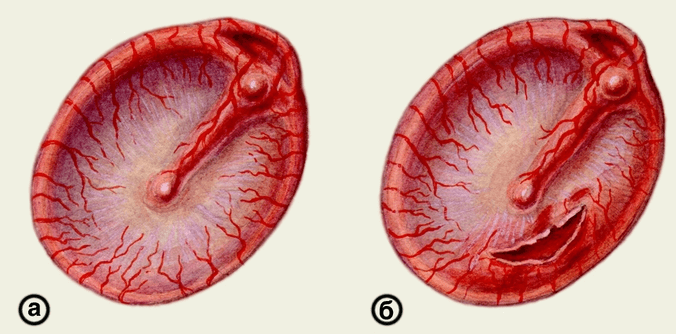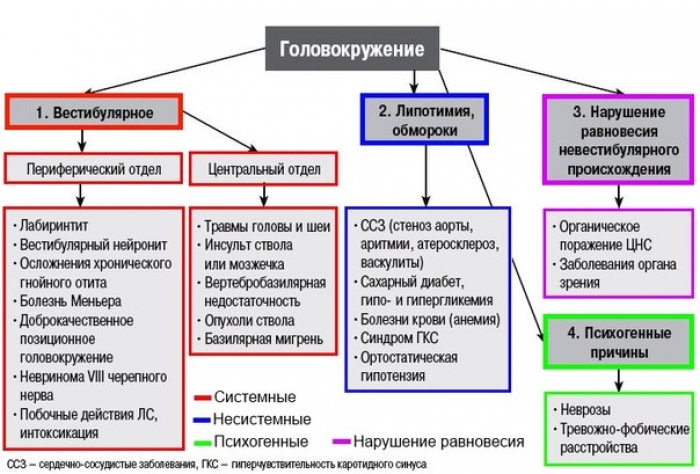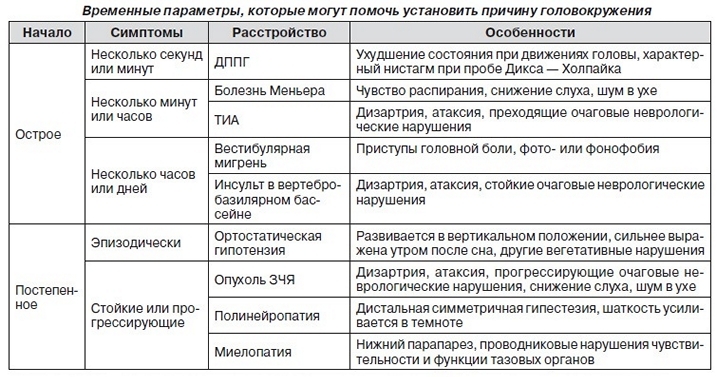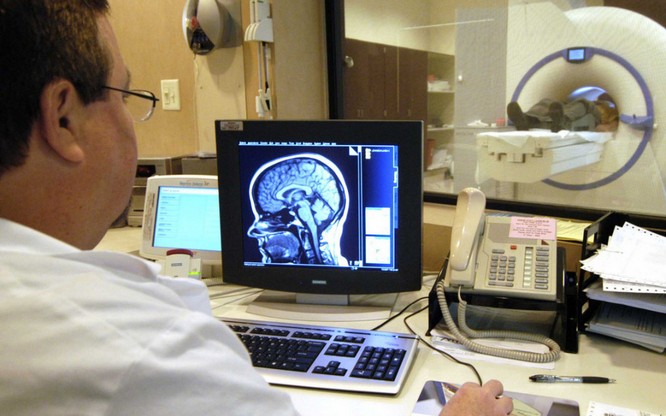Any signs of malaise serve as a signal of development pathological process. With a simultaneous combination of symptoms such as dizziness, nausea and vomiting, there are many possible reasons pathology. These manifestations can be observed in case of poisoning, various infectious diseases, anemia, brain injuries and disorders cerebral circulation, diseases of the vestibular apparatus. What are the most common causes of nausea, vomiting and dizziness, and when should you consult a doctor immediately?
Possible reasons
One of the most common causes of nausea and vomiting, which may be accompanied by dizziness and headaches, is considered to be poisoning or intoxication of the body during development infectious process. In such cases, the problem is often obvious. The patient can remember which product could cause such a reaction, moreover food poisoning usually accompanied periodic vomiting and stomach pain.
In case of infectious diseases may also be observed additional symptoms, such as increased body temperature, sore throat, headaches, aches in muscles and joints, general weakness.
In women, this condition can occur with sudden hormonal changes– on the days of menstruation, during pregnancy, at the onset of menopause. Nausea and dizziness are often side effects when taking potent drugs. medicines– antibacterial, anticonvulsant, cardiac, antihypertensive, sedative and other drugs.
Nausea, vomiting and dizziness are quite common among people suffering from basilar migraine. This condition can occur shortly before the onset of a headache attack and is usually accompanied by additional symptoms: tinnitus, darkening and flickering of spots in the eyes, and neurological disorders.
Dizziness, nausea and vomiting almost always appear after head injuries or with severe brain damage, such as compression, contusion, rupture of blood vessels. In cases where, after a fall or head injury, the patient experiences a short attack of nausea and one or more bouts of vomiting, it is important to seek medical help as soon as possible.
Almost all of the factors discussed above are usually obvious, and the rest are very easy to identify without lengthy detailed examinations. Many of them do not require comprehensive medical diagnostics and serious therapeutic measures. However, there are others, less obvious reasons ailments, and they are very diverse:
- diseases of the vestibular apparatus (inflammation of the auditory nerve, vertigo, Meniere's disease, neuritis of the vestibular nerve);
- pathology of cardio-vascular system(increased or decreased arterial pressure, atherosclerosis);
- tumor formations in the brain;
- anemia and nutritional disorders;
- cervical osteochondrosis;
- panic attacks;
- overwork, nervous or physical exhaustion, stress.
When to see a doctor
If the disturbing manifestations are not severe, it makes sense to observe your condition for some time. In cases where unpleasant symptoms caused by normal fatigue or minor violations gastrointestinal tract work serious reasons for worries, usually no.
If dizziness, nausea and vomiting get worse and general health is rapidly deteriorating, there is no need to waste time - you need to seek medical help as soon as possible. The same should be done if one or several symptoms of illness develop suddenly, for example, the patient suddenly feels weak, dizzy, or causeless nausea.
Diagnostic features
Depending on the nature of the symptoms and accompanying complaints, the doctor may prescribe the following diagnostic procedures to the patient:
- lab tests;
- electroencephalography and ECG;
- Ultrasound of brain vessels or internal organs;
- MRI of the brain;
- radiography cervical spine spine;
- pure tone audiometry.
First of all, you need to be examined by a therapist. After an initial examination, collecting anamnesis and analyzing the results of diagnostic studies, he can refer the patient to medical specialists– a neurologist, traumatologist, ENT specialist, cardiologist or other doctors with a narrow profile. According to the results comprehensive examination treatment is prescribed.
What can a patient do?
If an attack of nausea, vomiting and dizziness develops, the first thing you need to do is sit down or lie down in bed and try to calm down. If there is no one nearby who could help if the condition worsens, you should call your loved ones and ask them to come. If you feel sharp deterioration, you need to call an ambulance as quickly as possible. Even if all the unpleasant manifestations go away on their own, it is recommended to consult a doctor, especially if such attacks occur periodically and occur for no apparent reason.
After determining the cause of the illness, it is important to strictly follow medical instructions. For treatment to be more effective, you should refuse bad habits, carefully monitor the quality and diet, avoid stress and overwork.
In most cases, attacks of dizziness, nausea and vomiting do not pose a health risk. However, these symptoms may also indicate serious pathologies, therefore, when they occur, you should not self-medicate or be inactive, endure discomfort and hope that everything will go away on its own. If such manifestations occur frequently, are pronounced, or continue for a long time, be sure to undergo a medical examination.
Each of us has experienced dizziness at least once. It is caused by sudden head movements, fatigue or illness. Sometimes the feeling of dizziness and nausea is so strong that it can be accompanied by vomiting and the patient loses the ability to stand.
Nausea and dizziness - causes
More than eighty reasons are now known to explain the occurrence of dizziness. Most of them are quite harmless. These include hunger, fatigue or motion sickness in transport. However, this phenomenon indicates that the body is affected by the disease. The central nature of dizziness is characteristic of:
- injuries;
- migraine;
- epilepsy;
- circulatory disorders;
- tumors.
Peripheral dizziness is caused by:
- lesions of the vestibular apparatus or ear.
Due to such a number of reasons, diagnosing the disease is difficult. But it should be remembered that if the head is dizzy and brain damage is observed (double vision, loss of sensation in the limbs), then this indicates central lesion. If hearing deterioration occurs, then peripheral causes are considered.
Meniere's disease with vertigo
The nature of the pathology, accompanied by severe dizziness and nausea, and its causes have not been fully studied. Some experts believe that past injuries and infections influence the development of the disease. Its signs include:
- an attack of dizziness lasting several hours;
- nausea, vomiting;
- hearing impairment;
- sensation of pressure from the ear.
Symptoms last for about two weeks and reappear after a short break.
Severe dizziness, nausea, vomiting and weakness with vestibular neuritis
The disease is characterized by the occurrence of spontaneous dizziness, accompanied by vomiting, deterioration of balance, panic fear. When tilting the head, an increase in symptoms is observed. The hearing does not deteriorate; sometimes there is a feeling of fullness in the ears.
The nature of the disease remains unknown, but a connection has been noted with the development of neuritis after respiratory tract infections.
Weakness, dizziness, drowsiness, nausea during migraine
Headaches most often occur with migraines. During attacks, there is a disruption in the blood supply to parts of the brain that regulate the functions of the vestibular apparatus, which is why the person feels dizzy. Symptoms include not only dizziness, but also nausea, vomiting, photophobia, and loss of balance. Some people experience no pain during attacks.
Psychogenic dizziness
This pathology is false, since it is not caused by problems of the vestibular apparatus. It is believed that it is a manifestation that affects people prone to worry and anxiety. Main signs of the disease:

Dizziness and nausea in women
A typical reason for the development of this disease in women is the restructuring of hormones. Their number increases during menopause and menstruation, complicated by anemia. Hemoglobin deficiency causes the brain to lack oxygen, causing dizziness and mood swings. During menopause, pressure drops are observed, as well as an increase in nervous excitability. The manifestation of dizziness in pregnant women becomes a consequence low blood pressure and lack of glucose in the blood.
Dizziness is an unpleasant subjective sensation of rotation of surrounding objects in space relative to human body. It occurs more often in women. An additional symptom may be nausea. But in any case, it is important to consult a doctor to undergo an examination and find out the cause of this pathological condition.
Dizziness may be central or peripheral. In the first case, such a symptom is caused by a head injury, tumor or other brain damage. Peripheral dizziness occurs due to impaired functionality nervous system, or when the vestibular apparatus does not work properly. It can also be systemic (associated with diseases of the organs of vision or hearing) and non-systemic (appears as a result of toxicosis or with banal motion sickness).

It should be noted that dizziness is not always pathological. There is such a thing as vertigo. They talk about it when a subjective sensation of objects rotating occurs after a long ride on a carousel, while traveling by sea. Vertigo often appears in children and may be accompanied by nausea and vomiting.
The same symptom occurs if the patient, mostly a woman, is on a strict diet, and the food he consumes does not provide adequate intake. sufficient quantity useful substances into the body. In this case, it is observed.
Also, dizziness in women is considered normal during menstrual cycle or before it starts. This is caused by a violation hormonal balance at the patient. After finishing menstrual bleeding he is restored, and the unpleasant symptoms go away.
Causes of the pathological condition
However, dizziness is not always harmless. Sometimes it can be a symptom of a developing serious pathology.
Table 1. Causes of dizziness and nausea in women
| Features of the pathological condition | Causes |
| Dizziness and nausea | The following factors can cause symptoms: 1. Impaired blood supply to the brain, as a result of which it begins oxygen starvation. 2. Problems with the functionality of the vestibular apparatus. 3. Migraine (nausea is hallmark). 5. Diseases of the spinal cord. 7. Late pregnancy. |
| Women during menopause (after 50 years) | During menopause, dizziness is not uncommon, as degenerative processes begin in the body. They affect almost all body systems, especially the heart and blood vessels. A change is taking place hormonal levels. The causes of dizziness at this age are: · Defeats blood vessels. · Change intraocular pressure. · Spinal or head injury. |
| Elderly women | The main cause of this pathological condition is natural process aging of the body, from which no one can escape. A common cold or overwork can cause dizziness. Infectious pathologies may impair the functionality of the vestibular apparatus. May cause symptoms such as dizziness, drowsiness, weakness oncological diseases on early stage development. Health problems also appear if the patient once had a head injury. requires immediate intervention from doctors, since the compensatory capabilities of their body are reduced. |
Dizziness may occur different intensity. A woman’s performance largely depends on this. Sometimes she cannot get out of bed because she has additional symptoms.

Diagnostic features
Treatment should not be started without making sure that the dizziness is caused by a pathology. For this it is important to go through thorough examination which includes:
- Examination by a therapist, ENT specialist, neurologist, and other specialists (if necessary).
- Vestibular tests.
- Posturography.
- Ultrasound or .

Magnetic resonance imaging of the brain
- X-ray of the cervical region.
- Audiographic research.
- Determination of glucose level.
- General research blood.
- Dopplerography of cerebral vessels using a contrast agent.
After the attending physician compares all the results, he puts accurate diagnosis. The specialist who will prescribe and monitor treatment is determined.
First steps for dizziness
If dizziness occurs infrequently and is not caused by severe pathologies, then the attack can be relieved at home without the use of medications. It is important to follow several rules:
- If the symptom is provoked by nervous overstrain, then the woman needs to sit down and inhale ammonia.
- The presence of weakness or due to a change in the spatial position of the body (), may indicate the development orthostatic hypotension. In this case, sudden movements are contraindicated. Do not bend or squat quickly.
- If dizziness occurs after a head or spinal injury, then you should not self-medicate, but should quickly consult a doctor.
You will learn what to do in case of a pathological condition by watching the video:
- When getting motion sickness in transport, you need to have special tablets with you that can eliminate the attack. You can also relieve dizziness with the help of mint candies.
- If a woman is following a strict diet, then to eliminate the attack she should drink warm tea or eat candy. In the future, the diet needs to be revised and its calorie content increased, since the brain does not have enough glucose.
- The room should be well ventilated.
If the condition is serious, then depending on the cause of the pathology, the doctor will prescribe medication.
Drug treatment of pathology
Therapy is mainly symptomatic and is aimed at eliminating certain discomfort. However, you should always try to remove the very reason for their appearance. The patient may be prescribed the following medications:
- Antihistamines: Meclizine. Vertigo and the body's histaminergic system are closely related.
- Anticholinergics: Scopolamine.
- Tranquilizers. They calm the patient and remove increased level anxiety.
- Neuroleptics: Meterazine.
- Benzodiazepines: Seduxen, Diazepam.
- Antiemetics: Cerucal. At the same time, you need to monitor the amount of fluid in the body to prevent dehydration.
The drug Betagistin is quite popular. This is an analogue of histamine (structural), which can effectively eliminate the problem. Due to the release of neurotransmitters, blood circulation in the area improves inner ear. Side effects or the medicine is not addictive.
From the video with neurologist Alexey Sergeevich Borisov, you will learn about the use of the drug "Betaserc" (with active substance betahistine) in the treatment of dizziness:
You should not take the presented remedies for too long, as they significantly reduce the body’s own compensatory capabilities. It is better to remove the very cause of the development of the pathological condition.
Nonspecific dizziness is well treated with physiotherapeutic procedures. They strengthen positive effect medications. Vacuum and manual therapy, acupuncture.
Traditional therapy
Folk remedies can also help cope with this symptom. But Alternative medicine cannot be considered as the only The right way treatment. It cannot be used alone. Folk recipes should be used only with the permission of a doctor and in conjunction with drug treatment.
The following tools will be useful:
- During an attack, you can chew a small piece ginger root. It helps improve blood circulation in the body, in particular in the cerebral vessels. The woman gets her “second wind” and feels a surge of strength.
- Tea made from mint, linden and lemon balm. These drinks have a calming effect and eliminate nausea.
- At reduced level hemoglobin should be drunk 200 ml daily pomegranate juice. It contains a large amount of iron and prevents the development of anemia.
Exercises and hirudotherapy against dizziness:
- Excellent folk remedy considered ginkgo biloba. The plant prevents blood clotting, eliminates weakness, nausea and dizziness.
- You can drink raw potato juice before meals.
- Parsley infusion helps a lot. It is necessary to grind 10 g of plant seeds into powder, pour it into a half-liter jar and add water room temperature to the brim. It will take 8 hours to infuse. Next, the product is filtered and taken four times a day, half a glass. You should drink liquid before meals.
Folk remedies are not a panacea. They are not always able to get rid of. However, such medications can strengthen the immune system and stabilize the functionality of the nervous and cardiac systems.
Prevention of dizziness
A slight dizziness caused by physiological reasons and not repeated too often will not cause harm to the body. If such a condition is pathological, then its occurrence should be prevented. It is required to comply with the following preventive measures:
- You should not drink too much coffee or alcoholic beverages.
- We must stop smoking.
- It's better to do gymnastic exercises, which will strengthen the cardiac system and immunity in general.
- You should take frequent walks fresh air.
- Meals should be regular and nutritious. Fasting for weight loss will do nothing. Before starting a diet, it is important to consult with a nutritionist who will help you create a correct and healthy diet.
The video shows a set of exercises to prevent the syndrome:
- If a woman’s blood circulation is impaired, she can restore it cold and hot shower.
- If there is weather dependence, a woman should refrain from heavy food during magnetic storms.
- It is important to undergo regularly preventive examination see specialists and inform them about changes in your condition.
- You need to give up fatty foods and heavy foods.
- You should always control yourself, avoid situations that shake the nervous system, and increase your own stress resistance.
- It is better to avoid black tea and replace it with green tea, which contains a large amount of antioxidants.
Pathological dizziness disrupts not only performance, but also daily life. But you should not self-medicate. First of all, you should determine the exact cause of the pathology, and then begin to eliminate it.
Are you worried about nausea and dizziness? In such a situation, even people far from medicine suggest that a woman take a pregnancy test.
However, the cause of these symptoms is not always so joyful, and not only women of the reproductive period suffer from this illness. Most often, elderly people consult a doctor with complaints of dizziness and accompanying nausea. As studies show, the diagnosis is made quickly (in almost 90% of cases only on the basis of anamnesis): cerebrovascular insufficiency. Who doesn't have it?
Indeed, this is one of the causes of dizziness, but its frequency is greatly exaggerated. Patients start taking vascular medications, but there is no result.
In this article you can find the answer about the most common reasons the appearance of these symptoms and principles differential diagnosis.
Relevance of the problem

About 10-16% of patients regularly visit therapists and neurologists with complaints of dizziness and often accompanying nausea. About half of them are pensioners, 30% are employees intellectual sphere, and the rest - physical labor. Women suffer from dizziness (or go to the doctor) much more often: in 75% of cases. Dizziness significantly affects the quality of life: 40% of those who consult a doctor experience it daily, another 40% several times a week, and 10% constantly. Every fifth patient experiences this severe symptoms, that they interfere with ability to work, and people are forced to stay at home. In 10% of reported cases, attacks were accompanied by loss of consciousness.
A large study was conducted in St. Petersburg: patients with complaints of dizziness and accompanying nausea visited a therapist. He made a diagnosis and prescribed treatment. Then diagnostic studies, as a result of which the diagnosis was checked and corrected.
It turned out that in 40% of cases the therapist’s conclusion was as follows: “Dyscirculatory encephalopathy against the background of atherosclerosis and hypertension». This pathology was confirmed in only 10% of patients in this group. The diagnostic error was that conclusions were made only on the basis of complaints, age, medical history and taking into account risk factors.
Thus, despite the fact that only a doctor can understand the causes of dizziness and nausea, for a local therapist - a primary care specialist - this is sometimes very difficult to do. There are a few things to take into account here:
- You should not start treatment immediately after the conclusion established on the basis of complaints and anamnesis;
- It is necessary to check the preliminary diagnosis, no matter how obvious it may seem (due to age and other risk factors), using laboratory and instrumental methods;
- A neurologist and otolaryngologist have a wider arsenal of opportunities for differential diagnosis than a therapist.
It is very important to take into account the complexity of the structure of the vestibular analyzer, its connections with the central nervous system and the variety of diseases accompanied by a similar clinical picture.
In this regard, competent diagnosis of conditions manifested by dizziness and nausea consists of several stages:
- Firstly, the type of dizziness is determined. Based on this, an initial conclusion is made about the damage to which organ system it is caused by (vestibular or not);
- secondly, differential diagnosis is carried out in one of the directions:
- If the etiology is not related to the vestibular apparatus, then a therapeutic examination of the nervous, cardiovascular and other organs and systems is carried out.
- If dizziness is of vestibular etiology, then it is determined whether it has a central or peripheral genesis;
- thirdly, the nosological form of the disease is clarified.
What is dizziness?

The question of how a person feels dizzy, what exactly he feels, seems very strange. However, it should be the first one asked by the doctor.
The fact is that the concept of “dizziness” implies a feeling of instability and rotation in space own body or surrounding objects. According to research, dizziness is often referred to as slightly different sensations:
- severe weakness or faintness;
- emptiness in the head;
- ringing in the ears;
- swaddling clothes in front of you;
- darkening in the eyes;
- inability to concentrate;
- severe anxiety;
- lightheadedness, etc.
If the doctor does not determine what the person means by the term “dizziness,” the diagnosis may be made incorrectly. Hence, adequate treatment will not be received.
As practice shows, there is a high percentage of incorrect diagnoses of “stroke” or “stroke”, and even disability in this regard. While the cause of dizziness is a completely different disease that can be cured fairly quickly.
Classification of dizziness
Unsystematic dizziness
According to statistics, ¾ of patients who consult a doctor with autonomic disorders complain of dizziness, which has nothing to do with the illusion of rotation of their own body or objects around them. If the described clinic does not correspond to the picture of true dizziness, its cause should be sought not in the vestibular system, but in others, in particular:
- pathologies of the nervous system (dyscirculatory encephalopathy, circulatory failure of the vertebrobasilar zone, polyneuropathy and other diseases);
- disorders of the cardiovascular system (arrhythmias, heart failure);
- disorders of organ functioning internal secretion (diabetes, thyroid disease);
- diseases of the visual organs (myopia, presbyopia);
- anemia, etc.
The variety of diseases that are accompanied severe dizziness and nausea, requires painstaking differential diagnosis in order to identify the exact cause.
Systemic dizziness

A quarter of patients when visiting a doctor complain of true, or vestibular vertigo. It is often accompanied by other vegetative disorders:
- nausea, vomiting;
- hyperhidrosis (excessive sweating);
- changes in heart rate, fluctuations in blood pressure;
- nystagmus (involuntary rhythmic oscillatory movements eyeballs).
Distinguish the following types systemic dizziness:
- When you feel yourself rotating in the environment – proprioceptive;
- With the illusion of “swinging on the waves”, “falling” down, uneven support - tactile;
- With the apparent rotation of surrounding objects - visual.
Based on the level of damage, central and peripheral vestibular syndromes (CVS and PVS) are distinguished.
CVS is characterized by the following features:
- Occurs due to pathology of vestibular formations in the brain.
- The dizziness is not very strong, but long-lasting (maybe several days).
- During acute processes affecting the vestibular nuclei, a feeling of strong rotation may occur. Residual symptoms of vestibular dysfunction can last for years.
- Hearing impairment occurs rarely and is associated with damage to parts of the midbrain. It causes bilateral hearing loss.
- The nystagmus that occurs during CVS has some differences:
- it can be multiple (i.e., the movement of the eyeballs is carried out in different planes - vertical, diagonal, converging);
- in one eye the nystagmus is brighter than in the other;
- the upper limbs and body deviate towards the nystagmus or remain in place.
PVS is diagnosed based on the following features:
- Its cause is damage to the inner ear, vestibular ganglion and root of the 8th pair of cranial nerves.
- Dizziness is accompanied by vivid sensations of rotation, pronounced autonomic disorders in the form of nausea, vomiting, but lasts for a maximum of 24 hours.
- There is no clinic during the inter-relapse period. Residual dysfunction resolves quickly.
- Usually, hearing acuity decreases, and noise in the ear is bothersome.
- Nystagmus is characterized by the following differences:
- spontaneous oscillatory movements of the eyeballs are limited to the horizontal plane;
- on the right and left the amplitude and frequency of oscillations are the same;
- the arms and body deviate in the direction opposite to nystagmus.
The next step is to bring all the symptoms together. If they fit within the framework of one pathology, then the disease takes on a certain nosological form. If not, then the diagnosis specifies only the level of damage.
The most common but rarely diagnosed nosologies of dizziness
The stage of making a diagnosis for non-systemic dizziness is solved quite effectively, and disorders of the peripheral part of the vestibular apparatus are often hidden under the guise of other non-systemic diseases.
Psychogenic dizziness occupies a special place. According to American researchers, this species ranks second among other causes. It develops both in the presence of the disease and in its absence.
In people after forty years of age, so-called vertebrogenic dizziness often occurs. This type of vestibular disorder is often confused with cervical osteochondrosis.
A common cause of dizziness is acute (labyrinthitis, vestibular neuronitis) and chronic (sensorineural hearing loss, ) ear diseases, among which otitis media plays an important role.
Benign paroxysmal positional vertigo
This pathology has been known since 1952, and in 17-35% of cases it is the main cause of dizziness. However, in Russian medical literature it is poorly lit, so the bright and specific onset of the disease is often mistaken for a stroke.
With certain turns of the body or head, a feeling of strong rotation appears, accompanied by nausea, vomiting and nystagmus. The attacks occur violently, almost daily, but usually not for very long (maximum one minute). When a person changes body position, the manifestations of the disease stop.
Dizziness is caused by the following movements:
- if a person lies on his back;
- gets out of bed and takes a vertical position;
- turns from back to side;
- throws his head back;
- tilts the head or torso forward.
Nystagmus is directed towards the ground. Hearing is usually not affected.
Vascular medications, abundantly prescribed for the treatment of so-called stroke, do not help with this pathology. BPPV is caused by the movement of ear stones into the ampullary receptor of the semicircular tubules and its irritation. In the normal state, otoliths act as “weights” in the perception of gravity and acceleration. If they come off the membrane, they provoke an attack.
Diagnosis of the disease is confirmed by performing the Dix-Hallpike test. It is informative and quite simple to implement, however, as practice shows, only ENT doctors are familiar with it.
Treatment of this disease quite simple: fragments of ear stones in 80% of cases return to their place during a special vestibular maneuver. The doctor (usually an otolaryngologist) performs a certain alternation of turns of the head and torso.
Vertebrogenically caused vestibulopathy
Based on the patient's complaints of dizziness associated with turning or tilting the head, a preliminary diagnosis of osteochondrosis of the cervical spine is made. If the x-ray picture is confirmed, then the diagnosis is made. Dizziness is explained by insufficiency of cerebral circulation, which occurs as a result of compression of the vessels running in the transverse processes of the cervical vertebrae. And no one finds it strange that dizziness is the only sign of cerebral ischemia. Usually, with a true violation of the blood circulation of the brain, changes in the functioning of other organs and systems of central origin appear. Deterioration in vision, hearing, balance, changes in sensation or motor function upper or lower limbs, numbness of facial areas.
Ultrasound of the vessels of the neck and brain and MRI may reveal no signs of cerebral ischemia. In this case, the cause of short-term dizziness is vertebrogenically caused vestibulopathy.
With age, not only the osteochondral system undergoes changes, but also the receptor system: degenerative disorders affect the mechanoreceptors, which provide information to the vestibular system. As a result, the vestibular apparatus receives incorrect signals about the position of the head, which is accompanied by the occurrence of short-term dizziness. This is complemented by conflicting information about the distance to objects coming from the visual organs to the cerebral cortex, which is associated with age-related farsightedness.
Vestibular neuronitis
Due to some features, it is assumed viral etiology diseases:
- seasonal: peak at the end of spring;
- signs of epidemic damage: several family members often fall ill.
The attack occurs suddenly and is accompanied by severe vegetative symptoms, lasts from several hours to several days. The resulting nystagmus corresponds to all the characteristics of the PVS. A person loses the ability to move, since any attempt to change the position of the body is accompanied by severe attack. Interestingly, symptoms may improve with gaze fixation.
Sometimes the attack may be preceded by a slight dizziness that occurs several hours before. It persists for quite a long time after the attack in the form of residual effects.
Psychogenic dizziness
The expression “dizzy with happiness” is one of the characteristics of psychogenic dizziness (PG). Unfortunately, patients with this diagnosis rarely feel dizzy on happy occasions.
The difficulty of diagnosis lies in the fact that PG can enhance the existing clinical picture of vestibular or non-systemic dizziness, or bother the patient in the absence organic reasons for such symptoms.
In the first case, it may manifest itself as a response to stress due to the occurrence of clinical picture disease, and in the second – accompany mental disorders or some types of neuroses.
Psychopathy does not always immediately manifest itself when visiting a doctor. Typically, patients complain of non-systemic dizziness, then autonomic disorders appear in the form of nausea, vomiting, hyperhidrosis, etc. Over time, the symptoms are aggravated by the appearance of anxiety, sleep problems, and emotional disorders.
Usually the attack is provoked by stress, but patients rarely tell the doctor about this, as they associate personality changes with the existing dizziness and their anxiety about this.
The most frequent sight PG is phobic postural vertigo. The person complains of coordination problems, but no signs of them are detected. He develops a fear of falling, although the facts themselves have not been recorded. Typically, anxiety occurs in certain places, which provokes an attack of dizziness and autonomic disorders.
With this diagnosis, psychotherapy provides good help.
TV channel "Russia-1", program "About the Most Important Thing", theme "Dizziness: Find your reason"
- Brain disorders:
- Poisoning of various origins causes intoxication of the entire body, in particular the cerebral cortex, which can lead to quite serious health problems. Depending on the degree of poisoning, headaches, severe weakness, nausea leading to vomiting, constriction of the pupils, difficulty and pain when swallowing solid and liquid food and even saliva occur.
- Brain injuries, bruises and concussions, as a result, poor circulation and swelling of the organ. Depending on which area of the brain is affected and the symptoms appear. If the central part of the brain is affected, then problems with breathing and heart function are possible, so calling an ambulance is mandatory.
- Taking some medications does not have a sedative effect:
- Depression. The reason for this condition is problems in life, frequent stressful situations, forced regular insomnia, incorrect daily routine. During depression, heart pain and headaches are added to dizziness, weakness, nausea and drowsiness. You shouldn't treat depression on your own - it's serious problem, which only a specialist can handle.
It often happens that blood pressure and health are normal, but nausea and dizziness periodically occur in a person. This happens due to incorrect functioning of the vestibular apparatus.
The system that is responsible for balance is located in the inner ear. Further impulses move to visual analyzer, in the head and spinal cord, from where information is distributed to the skeletal and ocular muscles, which ensures a person’s balance in space.
Causes of dizziness and nausea at normal blood pressure:

All these reasons cause dizziness and nausea when normal pressure, moreover, the attacks happen suddenly, but also end abruptly.
Dizziness and nausea: causes in women

- During the PMS period, there is a release of large quantity serotonin in cerebrospinal fluid, which causes nausea and vomiting.
- During menstruation, nausea may occur due to the body's production of prostaglandins, which irritates the muscles and circulatory system, spasms the uterus, reduces the amount gastric juice– all these factors cause nausea in women.
- Such unpleasant symptoms: nausea and dizziness, can also be caused by the composition of certain tampons used during menstruation, as well as oral contraceptives.
- Climax. During menopause, a woman experiences hormonal changes, which causes changes in how she feels.
- Severe stress occurs more often in women than in men, since the weaker sex is a more emotional and impressionable creature.
Nausea and dizziness are symptoms that occur during the most various diseases, and pathological conditions or by physiological reasons. When symptoms recur regularly, no matter what caused them, an examination is required, which will stop the development of the disease and prevent an unpleasant outcome.

